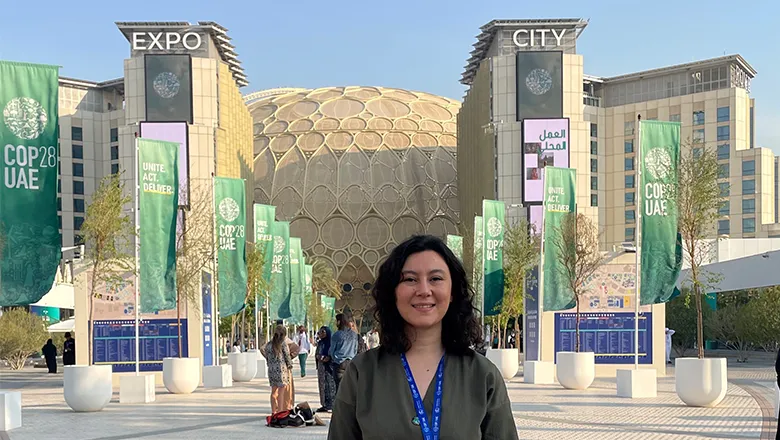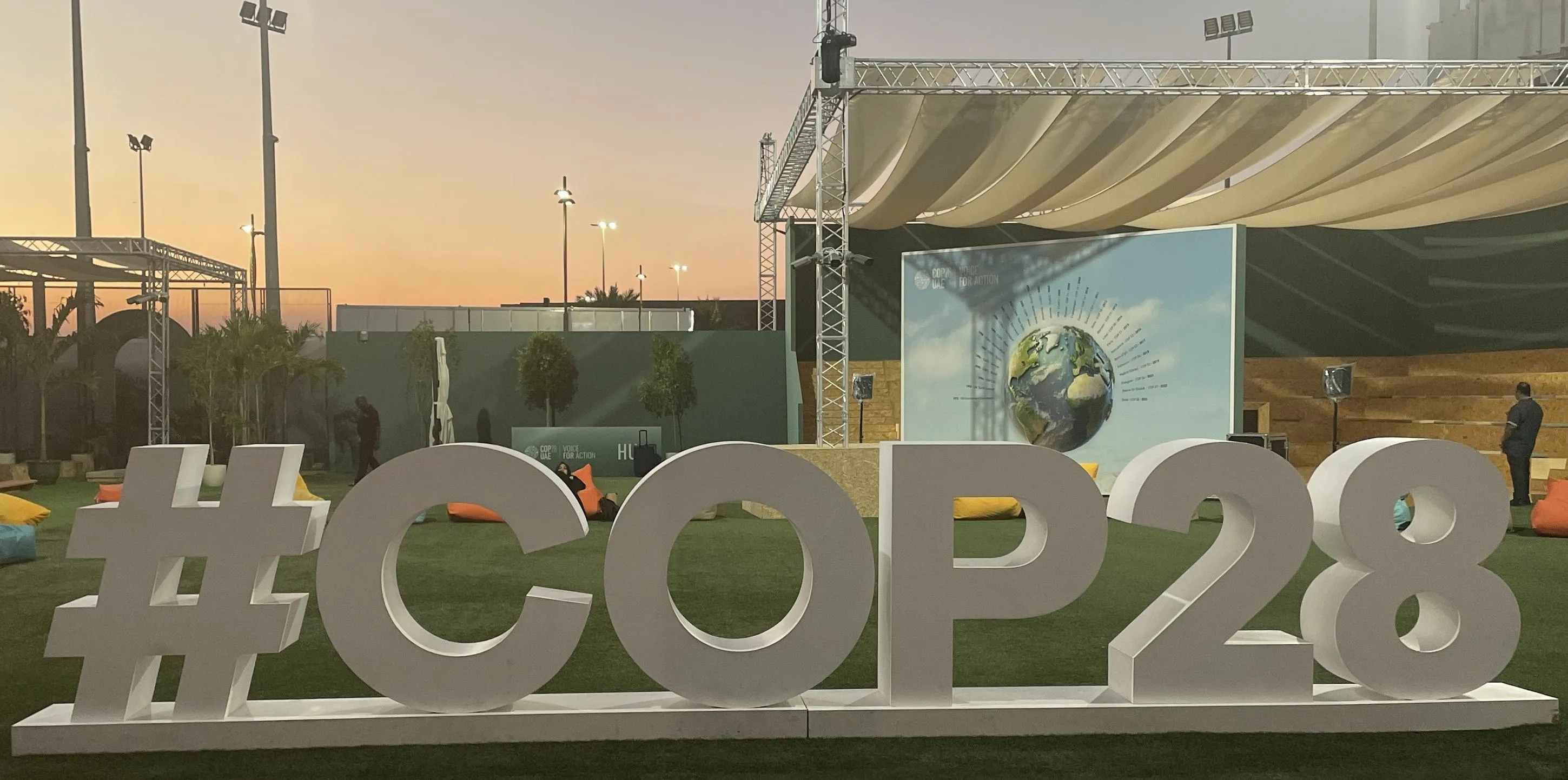The outcomes of this year's COP underscore the urgency of addressing climate change through actionable steps. While the conference did not yield an immediate ban on fossil fuels, it did emphasise the importance of gradually reducing their use. This approach, while a positive step, falls short of the urgent actions advocated by scientific findings.
08 January 2024
King's Law PhD student reflects on COP28
This year, Efsane Erdoğan, a PhD student and Visiting Lecturer in The Dickson Poon School of Law, attended COP28 in Dubai.

We spoke to Efsane to find out more about her experience at COP28 and to find out more about how this year’s conference related to her research.
Before attending, what did you hope to get out of your trip to COP28?
As the sole Early Career Researcher from the Law School, my agenda before Dubai included closely following the negotiations, and sharing the findings of my own research in climate talks. I envisaged attending not only contributes to the ongoing global dialogue but also provides a platform to connect with fellow researchers and experts in the field.
The COP meetings serve as an exclusive forum where government delegates shape future roadmaps and action plans for global wellbeing. Beyond their importance for current and future generations, these gatherings provide a unique opportunity for researchers focused on climate-related areas. Every year, the meetings host various events, discussions, and serve as a hub for engaging with like-minded researchers, NGO representatives, and government officials. This environment facilitates valuable interactions, allowing participants to share insights about their research and gain diverse perspectives on climate-related matters from various stakeholders.
How does your research link to the themes covered during this year’s conference?
My research aligns closely with the overarching themes of this year's conference, particularly in the context of addressing climate change through innovative strategies. By examining public procurement regulations in the EU from a climate change perspective, my work delves into an area that holds immense economic influence.
Public procurement, constituting a substantial portion of the GDP and taxpayers' money, stands out as the largest global business sector. In the EU alone, approximately 250,000 public authorities collectively allocate around 16% of European GDP, amounting to approximately €2.5 trillion, through annual procurement activities. This massive expenditure wields significant power to drive markets in a sustainable and climate-friendly direction.
Despite this potential, my research reveals that the EU has yet to fully exploit the possibilities within public procurement. The gap between the current utilisation of public procurement and its potential for green transition is a central focus of my work. I aim to challenge the conventional understanding of public procurement as a business-as-usual practice and critically analyse EU regulations to unlock its potential for catalysing a green transition.
This discrepancy between scientific urgency and international policy outcomes reinforces a central point in my research: the limitations of international law in acting promptly on climate issues. I interpret this as a call for polycentric governance mechanisms to supplement international law's slow progress and lack of effective mechanisms.
To meet the ambitious decarbonisation deadlines for 2030 and 2050, actions from every sector, including public sectors, are crucial. My research highlights the untapped potential of public procurement within the EU, a major global economy and home to some of the highest carbon-emitting countries.
This year, several references have been made to public procurement in Nationally Determined Contributions (NDC) of some countries, including the UK. They have incorporated procurement as a climate mitigation tool in their reports. This is a significant step toward establishing a link between climate mitigation efforts and public procurement, and hopeful development for my research as it reinforces one of the main arguments of my ongoing thesis.
However, legal hurdles within procurement frameworks hinder contracting authorities from seamlessly integrating climate considerations into their decision-making processes. This is a challenge I address in my research. I’m aiming to disseminate findings to increase awareness and contribute to climate action. My attendance at COP this year served as an initial step in disseminating these crucial insights and engaging in conversations that can drive positive change in environmental procurement.
All in all, the law should function as a facilitator rather than an obstacle in addressing climate change, especially considering the urgency of the issue as we all strive against a ticking clock. One way or another, failing to meet the deadline would have significant consequences for all humanity.
What is the most significant point you have taken away from this year's conference in relation to your work?
The standout takeaway from this year is a complex blend of victories for some and setbacks for others. While there are notable instances of concrete measures being taken or pledged, the overall pace remains inadequate to meet the envisioned decarbonisation deadlines. This reality reinforces a central premise of my research—that international law and intergovernmentalism alone are insufficient for addressing climate change.
The conventional top-down approach has consistently proven to be problematic, contributing to the slow progress observed at COP. The realisation that climate action requires a departure from this traditional model towards more diffused regulations is pivotal. There is a pressing need to fundamentally transform the legal system, altering the dynamics of how laws and regulations interact with environmental challenges.
In essence, the conference has reaffirmed the urgency of redefining our legal frameworks to establish a more proactive and effective relationship with the environment, transcending the limitations of traditional international law structures. This insight further motivates my research, emphasising the imperative of exploring alternative regulatory approaches for fostering meaningful and timely climate action - public procurement for instance.
What was the most interesting moment of your visit?
One of the most compelling moments of my visit was gaining a profound understanding of the local effects of climate change, transcending the global narratives of daily catastrophes. The conference offered a unique opportunity to delve into the intricacies of specific regions as countries had pavilions for visitors to showcase their work and the impact of climate change into their countries, such as the small island nation of Palau.
Palau is confronting an existential threat as rising sea levels pose a direct challenge to the island's very existence. Exploring this case in detail revealed the intricate ways climate change affects local ecosystems and economies. For instance, the threatened extinction of a local ointment with hundred years of recipe, "Luch ra Mamang," used by Palauans to treat bug bites, underscores the profound implications for indigenous practices as climate change disrupts the growth of the herbs in the local fauna. Notably, the commitment to environmental conservation in Palau is exemplified by the "Palau Pledge," a one-page document that visitors must sign before entering the island. This pledge urges visitors to respect the environment and leave minimal impact, emphasising the fragility of the local ecosystem. This case serves as a poignant example among many, with countries using the conference to showcase the diverse and impactful consequences of the climate crisis in their regions. Hearing these insights about the multifaceted angles of climate change effects added depth and nuance to my understanding, making this aspect of the conference particularly enlightening and impactful.
Another highlight of my visit was the opportunity to serve as a facilitator in one of the events held in Dubai. In this role, I directed discussion groups comprising law students and practitioners from diverse global backgrounds. Engaging in discussions on various aspects of climate law, participants shared their perspectives and experiences. The collective insights generated during these discussions were subsequently shared with wider audiences, fostering a collaborative brainstorming environment. This inclusive process even extended to government officials taking part in negotiations. The experience underscored the collaborative nature of COP as a forum where diverse stakeholders, including students, practitioners, and government officials, come together to learn from each other.
What tips would you give anybody else attending future COP meetings to support their research?
The negotiations themselves are intense, yet amidst this intensity, conferences, workshops, and side events organised by States, Institutions, and NGOs provide invaluable opportunities to expand your knowledge. This year's COP attracted nearly 70,000 attendees from around the world, making both the venue and the program bustling with activity. I strongly recommend having programs prepared and establishing a daily schedule in advance.
In my case, I opted to attend events that align closely with my research areas.


